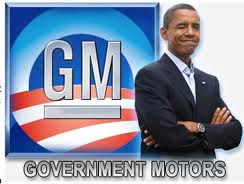They don’t call it “Government Motors” for nothing.
Once one of the “bluest” of America’s blue chip corporations, General Motors has seen better days. Early in President Barack Obama’s first term, it was nearly subsumed into the U.S. government on the grounds that a federal bailout – which amounted to a near takeover of the company – was necessary in order to save it from bankruptcy and to protect tens of thousands of American jobs.
The president campaigned for re-election on the success of his bailout of the auto industry which, truth be told, was confined to GM and Chrysler. There are plenty of companies that were and still are building cars and trucks in the United States that did just fine without the kind of interventions needed to keep two of what used to be called “The Big Three” from sliding into an economic abyss despite the recession.
For Obama, the bailout of GM was an opportunity to suggest that government intervention in the private economy, if it’s done right, can be a good thing and to present himself as a chief executive who cared, in contrast to the messaging flowing out of his campaign about his GOP opponent, former Massachusetts Gov. Mitt Romney.
But it turns out the American people may have been sold a bill of goods, that the so-called bailout of Chrysler and GM was more about saving the once all-powerful United Auto Workers’ union than it was about bringing the companies back to profitability. It’s a story that ranges from the slime to the ridiculous that should, as several recent news accounts suggest, be looked at more closely.
One is a story that ran in the October 14 edition of USA Today that said GM had “boosted prices of its redesigned 2014 full-size pickups $1,500 – enough to pay for a $1,500 rebate currently offered on most models.” The scheme is so bizarre on its face that it sounds like it could only have sprung from the mind of one of the automakers’ Washington overlords during the period immediately following the bailout.
The decision, to raise the price on future models to make up for revenues lost on account of the need to discount current inventories, came after yet another disappointing month of truck sales, which are down about 8 percent from the same time a year ago.
Moreover GM, which has already started to offer the 2014 models, is losing out to Ford, which was not part of the government bailout and generated – according to sales statistics – considerable brand affinity because of it.
It may be and is indeed likely that the people buying trucks are more conservative than those who by fuel-friendly hybrids and other, smaller vehicles. The stereotypes about them may be true; maybe they are just not buying GM trucks like they used to, just like they are not buying the line that the only way to save GM was by having taxpayers bail it out.
This is compounded by the fact that, in order to satisfy the demands of the Washington industrial policy makers, the company rolled out to great fanfare an electric car that still costs more than most people are willing to pay despite the fact that it is subsidized by the same taxpayers who are not buying it.
That’s small potatoes compared to what GM is doing on another front. As the Washington Examiner editorialized Thursday, the Obama administration has “quietly released the auto manufacturer from a bailout requirement that it increase its production in the U.S.”; the company is, instead, “spending billions of dollars building up its production capacity in China.”
“In exchange for the bailout in 2009,” the paper said, “GM promised to meet certain domestic car production targets over the next four years. The obvious point of this stipulation was to ensure that GM jobs remained here at home and weren’t shipped overseas,” but the company has consistently failed to meet them. The administration has allowed GM to waive those targets, the paper continued, even though it announced in June that it would boost its output from its China plants by 70 percent while “nearly doubling its export production capacity there from 77,000 units to 130,000.”
It’s time for Congress to take another close look at the bailout of General Motors, if for no other reason than to lay down markers for the next time the automakers comes to Washington hat in hand or the politicians go to Detroit with an offer they can’t refuse. Over time, the numbers just don’t seem to add up and it’s really starting to look like, together, the Obama administration and GM took taxpayers for a ride.
. . . . . . . . . . . . . . .
Peter Roff is a Senior Fellow at Frontiers for Freedom, a Washington, D.C.-based public policy organization advocating on behalf of limited government. Mr. Roff is also a contributing editor at U.S. News & World Report. Formerly a senior political writer for United Press International, he’s now affiliated with several public policy organizations including Let Freedom Ring, and Frontiers of Freedom. His writing has appeared in National Review, Fox News’ opinion section, The Daily Caller, Politico and elsewhere. Follow him on Twitter @PeterRoff.
